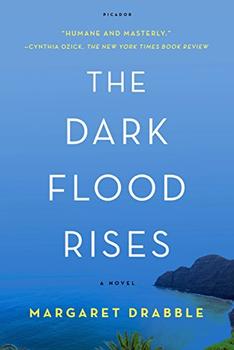Summary | Excerpt | Reviews | Beyond the Book | Readalikes | Genres & Themes | Author Bio

Fran loves regional TV. You find out a lot of odd things, watching regional TV up and down the land. She's glad she's still got the energy and the will to drive around England, looking at housing developments and care homes. She's a lucky woman, lucky in her work. Sometimes, in her more elevated moments, she thinks she is in love with England, with the length and breadth of England. England is now her last love. She wants to see it all before she dies. She won't be able to do that, but she'll do her best.
The charity that employs her doesn't cover Scotland and Wales.
She wouldn't mind dying on the road, driving around the country, though she wouldn't want to take any innocent people with her.
The dirty white van is far too close. The bad name of white van drivers is well deserved, in Fran's opinion.
There'd been another section in Brewer's, called 'Death from Strange Causes'. It wasn't as good as 'Dying Sayings', but it had its charms. Memorable recorded deaths, most of them occurring in antiquity, had involved the swallowing of goat-hairs, grape stones, guineas and toothpicks. According to Pliny, Aeschylus had been killed by a falling tortoise. Many have been killed by pigs. Some choke to death with laughter. Nobody, as far as she knows, has yet thought to keep the white van tally, which must be high.
She is looking forward to seeing her colleague Paul Scobey again. As she checks in at the Premier Inn reception desk, having parked in the allotted space in the subterranean metal car cage, there he is, sitting on an orange and purple couch in the foyer, nursing half a pint and watching a super-coloured soccer match on a giant overhead TV. He waves when she spots him, and she goes over to say hello, begging him not to interrupt his viewing. Paul is her friend and ally. He is far too young to share her first-hand empathetic familiarity with some of the needs of the elderly, but he has a pleasantly sardonic manner, a detachment that she finds enabling. He doesn't expect people to want what they ought to want. So many in the geriatric business can't understand the perversity of human beings, their attachments to or impatience with irrational aspects of their old homes and neighbourhoods, their sudden detestations of members of their family with whom they had rubbed along without protest for years, their refusal to admit that they were old and would soon be incapable. Paul seems unusually accepting of the changing vagaries of human need. He's in favour of community living and co-operative schemes, but he understands those who refuse to downsize and need at the end to die alone in a five-storey building, fixing the threat of a mansion tax with a cold eye. Carrots and sticks, says Paul. If you want to get them out, you have to tempt them out.
Fran doesn't like that phrase, 'carrots and sticks'. Old people aren't donkeys. But he's got the right ideas.
He has a mother living stubbornly alone in the house where he had been born, in the low-rise Hagwood 1950s estate on the western edge of Smethwick. He speaks of her sometimes, but not very often. He talks more about the merits and failings of corporation and council housing than he speaks of his mother, but Fran knows that thoughts of his mother inform his thinking. And he also has an elderly and long-demented aunt, his mother's older sister Dorothy, living very near to where they are now. A visit to see her is on his two-day agenda, and Fran has agreed to accompany him, to see the small care home where she has lived for years. This was his neck of the woods, not Fran's, although he himself now lives down south in Colchester.
Paul pats the couch by him, suggests she sit, and she sits. The leathery fireproof hollow-fill foam of the couch sinks deeply under her modest weight. She'll have to struggle to get up.
Excerpted from The Dark Flood Rises by Margaret Drabble. Copyright © 2017 by Margaret Drabble. Excerpted by permission of Farrar, Straus & Giroux. All rights reserved. No part of this excerpt may be reproduced or reprinted without permission in writing from the publisher.
Finishing second in the Olympics gets you silver. Finishing second in politics gets you oblivion.
Click Here to find out who said this, as well as discovering other famous literary quotes!
Your guide toexceptional books
BookBrowse seeks out and recommends the best in contemporary fiction and nonfiction—books that not only engage and entertain but also deepen our understanding of ourselves and the world around us.